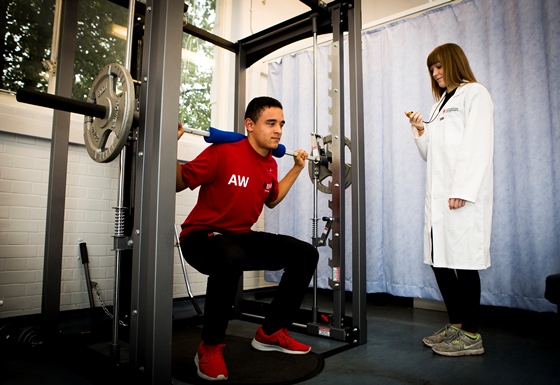People with diabetes are being offered free exercise classes as part of a De Montfort University Leicester (DMU) study to see the effect of regular exercise on people with the condition.
Academics are carrying out research into how weight training and cardio workouts can help people with Type 1 or Type 2 diabetes, or even people at risk of developing the disease.
Although there have been studies carried out assessing the effect of exercise on people with diabetes this is the first time academics have looked at a particular combination of cardio and resistance exercise for either Type 1 or 2 diabetes.

The project is being put together by Professor Joan Taylor and Dr Tarsem Sahota of the Leicester School of Pharmacy, together with a number of PhD students.
They are looking for volunteers between 18 and 55, with either Type 1 or 2 diabetes, or those at risk of the condition who do not suffer from any other medical conditions such as heart attacks, stroke or illnesses that prevent exercise.
Dr Sahota said: "The cost of treating complications associated with diabetes costs the NHS around £1million an hour so it really is one of the most pressing problems facing our health services. Either type can occur in anyone and it is very prevalent. We want to get an accurate picture of how beneficial simple exercise can be for people with the condition or in people who might be at risk of developing it.
"The exercise classes will be done here in our laboratory; we have a multi-gym weight machine and a recumbent bicycle and we are looking for volunteers to take 90 minute sessions two times a week, over a six week period. The intensity of exercise is moderate and will be assessed as safe for volunteers.
"We will be measuring oxygen and carbon dioxide levels, looking at changes to blood pressure ,fat and blood glucose levels. We will also be looking at other biochemical profiles in the blood that reflect the inflammatory nature that we now know underlie both type 1 and 2 diabetes.
"We know from previous studies that this kind of exercise leads to decreased blood pressure, fat and improved blood glucose levels and people who participated have not only lost weight but have been motivated to continue exercising after finishing these trials. We want to look at the combined effect of cardio and strength exercise for the first time and see just how much it can help people with or at risk of diabetes."
DMU is well-known for its pioneering diabetes research, with Professor Joan Taylor leading a project to develop an artificial pancreas, which can dispense insulin intelligently within the body, responding to variations in blood glucose levels.
And recently, DMU students have worked with Diabetes UK to identify and support people with Type 2 diabetes living in hard-to-reach communities in Leicester, through the Square Mile project.
Holding public roadshows in Leicester city centre, the students assessed more than 240 people, helping refer more than 170 of them to their GPs after spotting suspected signs of diabetes.
Anyone who wishes to take part in the free classes should contact Ashley.hill@dmu.ac.uk or can ring 0116 250 6220 for more information.
Posted on Monday 19 October 2015